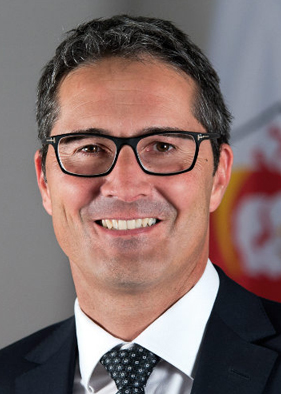April 2021, Year XIII, no. 4
Arno Kompatscher
The Double President
"As President of the Province, I have to govern the legislative and administrative complexity of almost all the sectors in the public sphere. However, the role of President of the Region is radically different because it is geared towards helping coordinate the two Autonomous Provinces, on the one hand, and handling regional issues, on the other."
Telos: Just as the English “premier” is not provided for – neither in name nor in his powers and roles – under the Italian Constitution, likewise governors find no place in our political framework. In Italy, the only one who can boast this title is the governor of the Bank of Italy.
Although not quite accurate and a reflection of how American terms have taken over the Italian media, don’t you think that the use of this word, politically and institutionally speaking, refers to someone who, according to the word’s Latin meaning of ‘guide, ruler,’ governs with great political responsibility?
Arno Kompatscher: The role of the President of the Region and of the Autonomous Province entails significant political and institutional responsibility, both in terms of the legislative and administrative competences attributed to regional/provincial administrations and because the regional/provincial executive committees are closer to citizens’ problems.
This is especially true for the Autonomous Provinces because their prerogatives are comparable to those of a small state. In our areas, people’s expectations are very high.
Here, there is the widespread awareness that “autonomy” is not just synonymous with greater powers, but with greater responsibility. So, our challenge is to live up to these expectations by not being self-referential and offering innovative and effective public policies that openly confront the big issues.
This is why, although it may not be the correct institutional term, I think the word “governor” reflects what we really are.
The breakdown in the party system has likely been the source of people’s widespread anti-political sentiment. And yet this gap between citizens and politics is not nearly as wide at the local level. Do you think people are still passionate about politics?
At the local level, the fact that electors are closer to their elected politicians certainly contributes to easing anti-political sentiment, even though this is a time in history when things are very complicated from this point of view. There are many reasons for this.
One thing that has certainly had a decisive impact is the breakdown in the party system, no longer seen as a forum for discussion, dialogue and analysis.
But there are also other reasons. Just think about the political system and its decision-making logic, which is becoming more and more self-referencing, or the rift that has developed in the last 10-15 years between the Institutions and society.
Not to mention how little consideration is given to competences, which should instead form the basis of political and institutional activity.
The hope is that this tendency is reversed, and political parties indeed play a key role in this, albeit they need to deeply change how they function.
You have a very unique role. In fact, you are President of both the Autonomous Province of Bolzano and of the Trentino-Alto Adige Region. Could you explain the difference between these two roles and their competences?
The main differences lie in the different legislative and administrative powers of these two Entities under the Italian Constitution (the Statute of Autonomy).
The Autonomous Province of Bolzano has primary competence in the majority of matters regulating the economic and social life of citizens, whereas the Region only has competence in fewer matters, including the most important one: the supplementary pension scheme.
The Autonomous Provinces have almost exclusive competence in administrative matters. So, as President of the Province, I have to govern the legislative and administrative complexity of almost all the sectors in the public sphere.
Yet the role of President of the Region is radically different because it is geared towards coordinating the two Autonomous Provinces, on the one hand, and creating a strategy to handle regional issues, such as public shareholdings in some limited companies, on the other.
2020: No one really expected to have to face an emergency like the one created by Covid-19. All over the world, the relationship between central and local government has become a source of great institutional tension. In Italy, on innumerable occasions, there has been conflict between the Central and Regional government, yet these occasions have multiplied and become more evident with the handling of the pandemic. How much of this is related to the healthcare emergency and how much to pre-existing problems? And what can we do to overcome it?
There is no question that the handling of the Covid-19 emergency brought a variety of problems to a head regarding the relationship between State and Regional governments, also because – from a legal point of view – we found ourselves facing questions and problems that were entirely new and highly controversial.
However, the conflict between State and Regions goes back much further and became especially heated after the 2001 Reform of Title V of the Italian Constitution and the ensuing constitutional jurisprudence. In terms of autonomous powers, the s.c. cross-sectoral competences made the legal framework more complex and certainly did not help promote our special competences. As Autonomous Provinces, to shore up our prerogatives, we must continue to strengthen the tool of implementing measures by offering innovative solutions that emphasise our uniqueness and traditional governing ability.
From a wider perspective, I think the time has come to devise a new overall Reform for Title V, underpinned by a revamped meaning of the subsidiarity principle, which should not be construed as competence centralisation, but also and mainly as strengthening the local dimension.
Marco Sonsini
Editorial
Trentino-Alto Adige and Bolzano: a breath-taking Region and Province, high up in the Italian Alps with only two geographical “plains” – Valle dell'Adige and Valle dei Laghi – only considered as such because they are under 200 m!
The region extends all the way to the tip of Lake Garda, almost connecting it to the sea. It is the Italian frontier, the country’s northernmost region and a haven for tourists.
It is a region where many languages are spoken and where their autonomy is sacred, yet respected like a duty, not exercised like a right.
This is the opinion of the man we have interviewed for the April issue of PRIMOPIANOSCALAc: Armo Kompatscher, President of the Autonomous Province of Bolzano and of the Trentino-Alto Adige Region: “Here there is the widespread awareness that autonomy is not just synonymous with greater powers, but with greater responsibility.” Kompatscher is the first in what we hope will be a PRIMOPIANOSCALAc series on Regional Presidents.
It begins with a truly special President, who, as you can see in the title of the interview, is a ‘double’ president! In his interview, he sheds light on the relationship between the Trentino-Alto Adige Region and the two Autonomous Provinces that make it up: Trentino and Bolzano.
It also offers an informed point of view on the never-ending tug of war in Italy between the State and Regional Governments, undoubtedly exacerbated by Covid-19.
Kompatscher is convinced that: “The time has come to devise a new overall Reform for Title V.” This 2001 Constitutional reform changed the balance of competences between the State and Regional governments. Click on this link for Telos A&S’ in-depth explanation of the issue: The State and the Regions: Who's in Charge?
Kompatscher has often said that, mainly at the beginning of the pandemic, all the political decision-makers found themselves in totally unchartered territory, and that right when swift decision-making was needed, they realised that they lacked the information they needed to make fully conscious choices: which is the worst situation you can find yourself in.
So what do you do? “Being in the eye of the hurricane mainly requires staying calm: calm in decision-making and calm which you must convey to citizens, even when your heart is pounding – and this is perhaps the most complicated part. In this kind of a situation, showing that you are aware and have a clear strategy is crucial to forge trust with citizens.”
According to Kompatscher, this closeness to citizens is one of the reasons why citizens feel less anti-political sentiment towards city government.
The local community and the responsibilities of those who govern are of the utmost importance to Kompatscher, so important that they were key points in his last election campaign:
“Governing means taking responsibility. I am ready to do that (…).” Autonomy means responsible self-government, or rather, deciding, for better or for worse, without caring whether or not your decisions are popular.
Which is what happened on 3 November 2020 when, even though his 30 October ordinance allowed cafes and ice cream and pastry shops to remain open, he had second thoughts and made the whole Region a red zone for three weeks.
The April cover of PRIMOPIANOSCALAc features another torn white page revealing the interview in Italian and English underneath, with an insect looking up at the words.
And the one we have chosen for Kompatscher is none other than the bee, an insect that lives in a perfectly organised society where each individual has a role and performs functions aimed at safeguarding and maintaining the wellbeing of the community.
What is more, Alto Adige has a deeply rooted tradition of beekeeping and even has a specific beekeeping museum: the Plattner Apiculture Museum, in one of the oldest and most treasured farmsteads on the Renon plateau.
There are nearly 37,000 bee colonies in the Bolzano province and there are roughly 460 species of wild bees. Kompatscher sure does have his work cut out for him!

Arno Kompatscher has been the President of the Autonomous Province of Bolzano since 2014 and President of the Autonomous Region of Trentino-Alto Adige since 2016, elected with the Sudtirolese Popular Party – Südtiroler Volkspartei (SVP).
In 2013 he was elected councilor for the Autonomous Province of Bolzano and, from 2011 to 2013, was the President of the Consortium of Municipalities of the Bolzano Province and of the Council of Municipalities.
He first held elective office in 2005 when he was the Mayor of the Fiè Municipality in Sciliar. He was re-elected in 2010 and remained in office till 2013.
Before getting involved in politics, Kompatscher was a teacher of law and economy at a technical-business secondary school and at a classical studies secondary school in Bolzano (1997-1998), Head of the legal and contracts department of the Castelrotto/Kastelruth Municipality (1998-2004) and President of the Board of Administration of Cabinovia Alpe di Siusi (2004-2013).
He has a degree in Law and studied at the Universities of Padua and Innsbruck. In 1990-1991 he served in the Alpine Corps. An important experience for him while studying at university was working as a blacksmith and tinsmith for the family business.
He loves sports. He has played football since he was six years old. He plays hockey, enjoys running and it is almost impossible not to run into him around Bolzano on his bike.
He adores music, from rock to jazz to avant-garde, and plays the trumpet. He loves acting and was the founder and organizer of cultural events such as the Magic-Schlern music, dinner & spectacle and the Schlern International Music Festival.
Arno is 50 years old and lives in his hometown of Fiè with his wife Nadja and their seven children.







SocialTelos